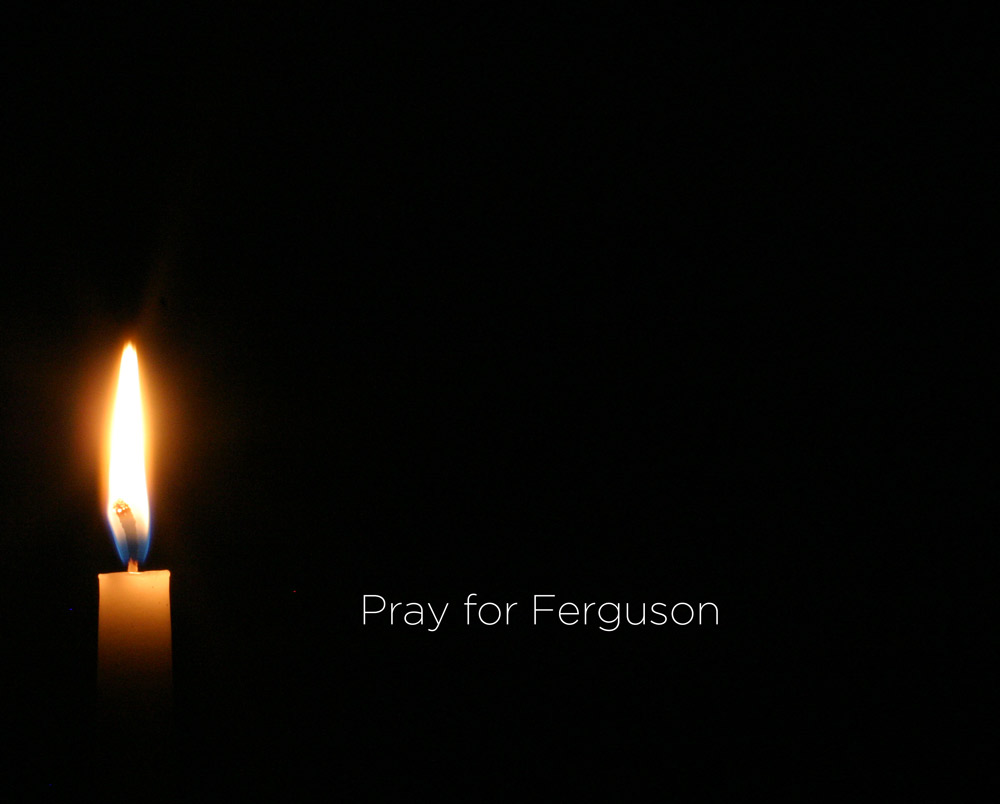Racism

Are you feeling pressure to be thankful?
We are in the midst of the Thanksgiving season. I’m reminded everywhere I go to “Be thankful!”
Well, call me the Scrooge of Thanksgiving, but I’m just not feeling thankful. The more someone tells me to “Be thankful!” the more I feel a sense of despair.
Be thankful? In the midst of Ferguson, Mo.? Jim Wallis writes that, “Many black families woke up this morning knowing that the lives of their children are worth less than the lives of white children in America.” And what will white America do about it? Nothing new. One side will continue the status quo of racism by denying that it even exists and then they will blame the victims. I firmly stand in the other side that blames America’s deeply embedded structures of racism, economic injustice, and educational inequality. To make matters worse, America is sharply divided over the shooting in Ferguson. Each side of the division blames the other for tragic violence. Sunday’s heated debate on Meet the Press between former New York Mayor Rudy Giuliani and Georgetown Professor Michael Eric Dyson is indicative of the deep racial tensions underlying not only Ferguson, but every city in the United States.
My Facebook news feed and the media are telling me how I’m supposed to feel about Ferguson. Outraged. Hurt. Anxious. Guilt. Anger. Bitter. But certainly not thankful.
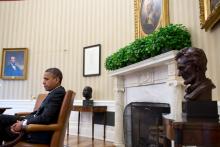
The shooting of Michael Brown and the failure of a grand jury to indict the shooter, Darren Wilson, are symptoms of a wider malaise.
It is part of a deep-seated illness that infects our body politic: racism.
The sad reality is that so many people believe we live in a post-racial society because we have a black president. We cannot address the issue, challenge ourselves and transform our societies without a prophetic voice. Ferguson is the space where I see that voice re-emerging into America’s consciousness.
Racism is not just about individual acts. It is about a system that allows unarmed black boys to be shot at a rate 20 times that of white boys; it allows a prosecutor to deliver a speech as a defense attorney for the accused after he fails to get an indictment. It is a system that has a black president telling people to calm down as the police, in military gear, attack them.


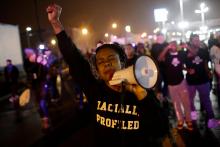
A grand jury has found that no probable cause exists to indict Darren Wilson, the Ferguson, Mo., police officer who shot and killed 18-year-old Michael Brown, on Aug. 9, said St. Louis County Prosecuting Attorney Robert P. McCulloch on Monday evening.
McCulloch said the grand jury was instructed on the law and presented on five possible indictments. He emphasized that the jurors "are the only people who have heard and examined every witness and every piece of evidence."
Protests throughout the St. Louis metro area — as well as nearly 100 cities across the country — are planned in response to the decision. Last week, Missouri Gov. Jay Nixon declared a preemptive state of emergency and activated the National Guard to respond to “any period of unrest that might occur following the grand jury’s decision concerning the investigation into the death of Michael Brown.” Rev. Traci Blackmon, a clergy leader in the St. Louis area, recently told Sojourners that while the city and county police departments have amassed weapons and riot gear to react to the protests, local community leaders and faith groups have been stocking up on bandages and first-aid materials.
Earlier in the day Brown’s family asked for 4.5 minutes of silence this evening before protests begin — a statement on the 4.5 hours Michael Brown’s body was left in a Ferguson street following the shooting.
The Justice Department is conducting its own federal investigation, however recent reports have indicated that it is not likely to result in civil rights charges against Wilson.
Stay tuned to Sojourners for continued updates and analysis.

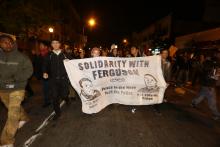
In an intimate conversation between Jesus and his disciples, just before Jesus predicts that Peter will deny him three times, Jesus asks Peter, “Will you lay down your life for me?” As Jesus’ crucifixion approaches, his question to Peter becomes reality, and the people who know of Jesus or his movement must make a choice — to suffer and die with Jesus, or to slip away in fear and passivity — to welcome Christ, or to reject Christ.
Peter is certainly not the only one to face this decision. Judas must choose to betray Christ or not; the high priests must choose between power and mercy; Pilate must choose the approval of the people or trust his own conscience. These individuals, however, do not stand alone in their decision-making, but among one of the strongest but often overlooked characters in Scripture — the crowd. As Jesus stands before Pilate, it is not Pilate who truly holds power — it is the raging crowd before him that demands for the freedom of Barabbas and the crucifixion of Jesus.
When looking back on the crowd’s decision, it is easy to see how wrong it was until we begin to ask where we stand among the crowd in our time. In the case of Ferguson and the grand jury’s decision on Darren Wilson, most of us stand in the crowd, waiting to see what the grand jury and the state may do while we decide what we must do. All eyes are on the jury, yet many of us who are watching realize that the real power does not reside in Gov. Jay Nixon or the grand jury, but in us. Just as it is the crowd who sways Pilate to crucify Jesus, so it is we who can determine whether justice comes in Ferguson and everywhere where racism exists. As bell hooks writes, “Whether or not any of us become racists is a choice we make. And we are called to choose again and again where we stand on the issue of racism in different moments of our lives.” Today, we have another choice. The grand jury is under the spotlight, but we are all responsible.

What do you see when you look at this picture?
In essence, that is the question St. Louis Prosecuting Attorney Robert McCulloch asked the grand jury to determine in his case against Officer Darren Wilson, who shot and killed unarmed 18-year-old Michael Brown on Aug. 9 in Ferguson, Mo.
According to an early report in TIME, McCulloch made an unusual move: He did not specify a specific charge for Wilson.
In a recent phone interview, Denise Lieberman, co-chair of the Don’t Shoot Coalition and senior attorney for the Advancement Project, explained to me: “Grand jury proceedings occur in private, so we don’t know exactly what’s been said … However, we’ve been told that the prosecutor is not making a recommendation to the jury about whether to indict and what charges … That is fairly unusual, if in fact that is true.”
Rather than specifying charges, two senior attorneys in his office are presenting all the evidence as it becomes available and letting the grand jury decide what charge(s), if any, that evidence warrants. McCulloch’s office claimed this process is fair because the grand jury, which is representative of the community of St. Louis, is able to see all of the evidence and then offer its decision.
According to Ed Magee, a spokesperson from McCulloch’s office, grand juries usually only review a few pieces of evidence. “Normally they hear from a detective or a main witness or two. That’s it,” Magee said in an early September interview with the Washington Post.
By presenting all the evidence to laypeople, reportedly without legal interpretation, McCulloch is basically raising a proverbial Rorschach to the grand jury and saying, “see what you see.” That is not a passive act in a society where 75 percent of people tested display some measure of unconscious racial bias.
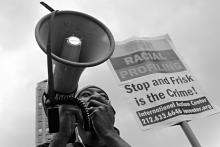
The other night in Central Park, three African-American young men were stopped by a police officer and asked if they had or were selling drugs. The answer was “No!” They were three students from Columbia University making their way from the East Side to the West. This tale unveils the problem of implicit bias in our society today.
The reason the three college students were stopped in Central Park was because they were “walking while being black.” Because of New York’s stop-and-frisk practice that targets black and brown young men, a growing number of African-American and Latino youth are being introduced into the New York state criminal justice system daily.
The statistics are staggering. African Americans are incarcerated at six times the rate of whites in the U.S. prison system. One out of every 15 African Americans over 18 years old are incarcerated, while 1 out of every 106 white males of the same age are incarcerated. In The New Jim Crow, Michelle Alexander argues that there are more African Americans in the criminal justice system than were enslaved in 1865. As Jim Wallis has argued, racism is America’s original sin.

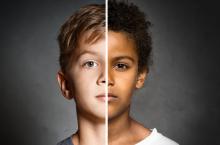
After your recent relocation to a new city, you are invited to a local congregation by one of its members. After that first visit, you don’t find anything compelling you to come back to worship the following Sunday.
Now fast forward five years. For some unknown reason, you find yourself visiting that same congregation. But this time, it is obvious that something dramatic has happened; a new senior pastor has been called, and, in less than a year, the transformation of the church has been dramatic. The trend of slowly losing members has now stopped. To the delight of longtime members, almost every Sunday new people are accepting Christ or renewing their commitment to Christ. Vibrant children, youth, and family ministries are now in place. Ten percent of the budget is dedicated to local and global mission. People are growing deeper in their faith. The congregation of a little less than 400 begins to grow in such a way that during the following five years it reaches 1,600 members. This time around, you and your family decide to join this congregation. Your faith is reenergized and you feel like you are finally in the right place.
The story could end here and we could say, “This family happily and faithfully journeyed with this congregation for many years.”
There was only one problem in this successful congregation.



One of the greatest sermons I ever heard on the subject of communion was offered by the head pastor of a Christian Missionary Alliance church in Princeton, N.J., back in the late 1980s. This pastor spent most of that sermon talking about the cross and how Jesus’ body was literally broken. I can still hear the crunch of the nails going into Jesus’ wrists that I heard in my mind’s ear that Sunday. And this wasn’t Easter week. It was just a communion Sunday.
Toward the end of his sermon, the pastor brought out a piece of saltine cracker that lay in the communion plate. He cracked it and then he said this: “Every time I take communion I hear the crack of the bread in my mouth and I bite and remember the crack of Jesus’ bones … and I remember that I did that.”
I wept as we took communion that day.
But isn’t that really about dis-union — the dis-union of Christ’s actual physical body? The cracking of his bones, the breaking of his legs, the piercing of his flesh; the cross seems to be more about a breaking apart than a bringing together of Christ’s body.
Right now when I see the lived reality of the church in our world, it seems we are more in a state of dis-union than communion.





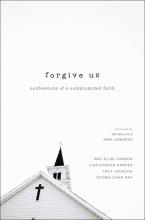
I attended Catholic school for one year as a child. My second-grade year in Philadelphia’s St. Athanasius left me with a strong sense of the mystery of the church. The most mysterious space there was the confessional booth. I wasn’t allowed to enter because I wasn’t Catholic, so I just sat and watched others enter with pinched brows. Then they would exit with peace painted over their faces.
There is a scene in the book Blue Like Jazz where author Donald Miller sets up a confessional box in the center of the Reed College campus. But Miller’s confessional worked in reverse. Students of Reed, which is known as the most liberal campus in the country, entered the confessional booth with curiosity, cynicism, skepticism, or worse — to disprove this thing called Christianity. But what they encountered upon entry was disarming — even healing. Rather than prompts to confess their sin, Miller sat on the other side of the veil and confessed of the sins of the church. This was a revolutionary act in the context where, according to Gabe Lyons and David Kinnaman’s modern classic, UnChristian, the general consensus about Christians is decidedly negative.
